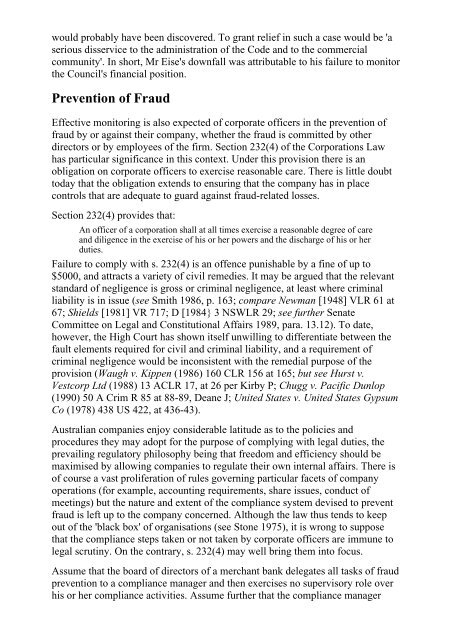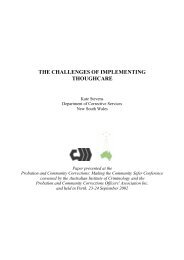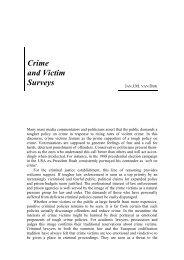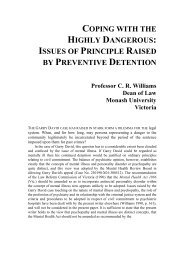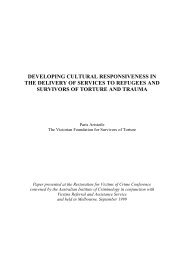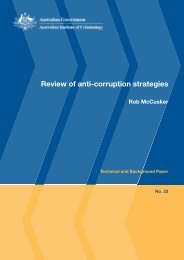Fraud and the liability of company directors - Australian Institute of ...
Fraud and the liability of company directors - Australian Institute of ...
Fraud and the liability of company directors - Australian Institute of ...
Create successful ePaper yourself
Turn your PDF publications into a flip-book with our unique Google optimized e-Paper software.
would probably have been discovered. To grant relief in such a case would be 'a<br />
serious disservice to <strong>the</strong> administration <strong>of</strong> <strong>the</strong> Code <strong>and</strong> to <strong>the</strong> commercial<br />
community'. In short, Mr Eise's downfall was attributable to his failure to monitor<br />
<strong>the</strong> Council's financial position.<br />
Prevention <strong>of</strong> <strong>Fraud</strong><br />
Effective monitoring is also expected <strong>of</strong> corporate <strong>of</strong>ficers in <strong>the</strong> prevention <strong>of</strong><br />
fraud by or against <strong>the</strong>ir <strong>company</strong>, whe<strong>the</strong>r <strong>the</strong> fraud is committed by o<strong>the</strong>r<br />
<strong>directors</strong> or by employees <strong>of</strong> <strong>the</strong> firm. Section 232(4) <strong>of</strong> <strong>the</strong> Corporations Law<br />
has particular significance in this context. Under this provision <strong>the</strong>re is an<br />
obligation on corporate <strong>of</strong>ficers to exercise reasonable care. There is little doubt<br />
today that <strong>the</strong> obligation extends to ensuring that <strong>the</strong> <strong>company</strong> has in place<br />
controls that are adequate to guard against fraud-related losses.<br />
Section 232(4) provides that:<br />
An <strong>of</strong>ficer <strong>of</strong> a corporation shall at all times exercise a reasonable degree <strong>of</strong> care<br />
<strong>and</strong> diligence in <strong>the</strong> exercise <strong>of</strong> his or her powers <strong>and</strong> <strong>the</strong> discharge <strong>of</strong> his or her<br />
duties.<br />
Failure to comply with s. 232(4) is an <strong>of</strong>fence punishable by a fine <strong>of</strong> up to<br />
$5000, <strong>and</strong> attracts a variety <strong>of</strong> civil remedies. It may be argued that <strong>the</strong> relevant<br />
st<strong>and</strong>ard <strong>of</strong> negligence is gross or criminal negligence, at least where criminal<br />
<strong>liability</strong> is in issue (see Smith 1986, p. 163; compare Newman [1948] VLR 61 at<br />
67; Shields [1981] VR 717; D [1984} 3 NSWLR 29; see fur<strong>the</strong>r Senate<br />
Committee on Legal <strong>and</strong> Constitutional Affairs 1989, para. 13.12). To date,<br />
however, <strong>the</strong> High Court has shown itself unwilling to differentiate between <strong>the</strong><br />
fault elements required for civil <strong>and</strong> criminal <strong>liability</strong>, <strong>and</strong> a requirement <strong>of</strong><br />
criminal negligence would be inconsistent with <strong>the</strong> remedial purpose <strong>of</strong> <strong>the</strong><br />
provision (Waugh v. Kippen (1986) 160 CLR 156 at 165; but see Hurst v.<br />
Vestcorp Ltd (1988) 13 ACLR 17, at 26 per Kirby P; Chugg v. Pacific Dunlop<br />
(1990) 50 A Crim R 85 at 88-89, Deane J; United States v. United States Gypsum<br />
Co (1978) 438 US 422, at 436-43).<br />
<strong>Australian</strong> companies enjoy considerable latitude as to <strong>the</strong> policies <strong>and</strong><br />
procedures <strong>the</strong>y may adopt for <strong>the</strong> purpose <strong>of</strong> complying with legal duties, <strong>the</strong><br />
prevailing regulatory philosophy being that freedom <strong>and</strong> efficiency should be<br />
maximised by allowing companies to regulate <strong>the</strong>ir own internal affairs. There is<br />
<strong>of</strong> course a vast proliferation <strong>of</strong> rules governing particular facets <strong>of</strong> <strong>company</strong><br />
operations (for example, accounting requirements, share issues, conduct <strong>of</strong><br />
meetings) but <strong>the</strong> nature <strong>and</strong> extent <strong>of</strong> <strong>the</strong> compliance system devised to prevent<br />
fraud is left up to <strong>the</strong> <strong>company</strong> concerned. Although <strong>the</strong> law thus tends to keep<br />
out <strong>of</strong> <strong>the</strong> 'black box' <strong>of</strong> organisations (see Stone 1975), it is wrong to suppose<br />
that <strong>the</strong> compliance steps taken or not taken by corporate <strong>of</strong>ficers are immune to<br />
legal scrutiny. On <strong>the</strong> contrary, s. 232(4) may well bring <strong>the</strong>m into focus.<br />
Assume that <strong>the</strong> board <strong>of</strong> <strong>directors</strong> <strong>of</strong> a merchant bank delegates all tasks <strong>of</strong> fraud<br />
prevention to a compliance manager <strong>and</strong> <strong>the</strong>n exercises no supervisory role over<br />
his or her compliance activities. Assume fur<strong>the</strong>r that <strong>the</strong> compliance manager


